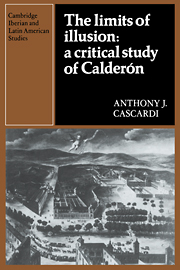Book contents
- Frontmatter
- Contents
- Preface
- Acknowledgments
- Note on texts and notes
- Introduction
- 1 La vida es sueño: Calderón's idea of a theatre
- 2 La dama duende
- 3 Calderón and Tirso: El galán fantasma
- 4 El secreto a voces: language and social illusion
- 5 Toward tragedy
- 6 El médico de su honra
- 7 Herod and Hercules: theatrical space and the body
- 8 El mágico prodigioso and the theatre of alchemy
- 9 The illusions of history
- 10 Authority and illusion: En la vida todo es verdad y todo mentira
- 11 The use of myth: Eco y Narciso
- 12 Prometheus and the theatre of the mind
- 13 Calderón's last play: the comedia as technology and romance
- Notes
- Index
7 - Herod and Hercules: theatrical space and the body
Published online by Cambridge University Press: 01 March 2010
- Frontmatter
- Contents
- Preface
- Acknowledgments
- Note on texts and notes
- Introduction
- 1 La vida es sueño: Calderón's idea of a theatre
- 2 La dama duende
- 3 Calderón and Tirso: El galán fantasma
- 4 El secreto a voces: language and social illusion
- 5 Toward tragedy
- 6 El médico de su honra
- 7 Herod and Hercules: theatrical space and the body
- 8 El mágico prodigioso and the theatre of alchemy
- 9 The illusions of history
- 10 Authority and illusion: En la vida todo es verdad y todo mentira
- 11 The use of myth: Eco y Narciso
- 12 Prometheus and the theatre of the mind
- 13 Calderón's last play: the comedia as technology and romance
- Notes
- Index
Summary
El médico de su honra is certainly one of Calderón's more suggestive plays. In it, as in all his best work, he invests the stage with an enormous range of functions. The theatrical metaphor of role, the poetic formulae of honor, the intimations of ritual and sacrifice are not merely figurative forms, poetic contrivances. Calderón sees that the stage has the power to make these notions concrete, real, that representation implies a bodying forth of the autistic gestures latent in language and thought. In El médico Calderón envelops the stark brutality of human sacrifice in a religious aura; in so doing, he tempers its raw power. Through Pedro, he solicits responses of reasoned judgment, compassion, and pity. He uses the stage as an arena for embracing these competing reactions. What distinguishes his theatrical “idea” in El médico from the merely “dramatic” ideas prominent in Aristotle's Poetics and its Renaissance avatars is the spatial factor. Only because Calderón understands the capacities and limitations of representational space is he able to bring together the redoubtable set of tensions we find in El médico.
As much as if not more than in El médico, Calderón explores the implications of theatrical representation in his Herod play, El mayor monstruo del mundo. By means of spatial dimensions, Calderón probes the insatiable and seemingly limitless desires of the Tetrarch of Jerusalem. In him Calderón sees the personal consequences of human acquisitiveness, the inward destruction wrought by the will to power and possession.
- Type
- Chapter
- Information
- The Limits of Illusion: A Critical Study of Calderón , pp. 82 - 95Publisher: Cambridge University PressPrint publication year: 1984

